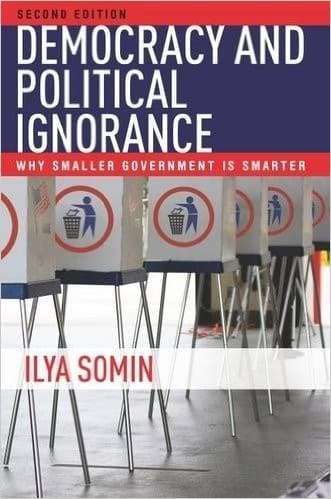The Volokh Conspiracy
Mostly law professors | Sometimes contrarian | Often libertarian | Always independent
The second edition of my book "Democracy and Political Ignorance" - and why I wrote it

The much-revised and improved second edition of my book Democracy and Political Ignorance: Why Smaller Government is Smarter has just been published by Stanford University Press. Here's a brief summary of the book, and of the new material added in this second edition:
One of the biggest problems with modern democracy is that most of the public is usually ignorant of politics and government. Many people understand that their votes are unlikely to change the outcome of an election and don't see the point in learning much about politics. This creates a nation of people with little political knowledge and little ability to objectively evaluate what they do know.
Ilya Somin mines the depths of public ignorance in America and reveals it as a major challenge for democracy. He weighs various potential solutions, provocatively arguing that political ignorance is best mitigated and its effects lessened by decentralizing and limiting government. People make better decisions when they choose what to purchase in the market or which state or local government to live under, than when they vote at the ballot box, because they have stronger incentives to acquire relevant information and to use it wisely.
The second edition of Democracy and Political Ignorance fully updates its analysis to include new and vital discussions of the "Big Sort" and its implications for "voting with your feet," the connection between political ignorance and the disproportionate political influence of the wealthy, new proposals for increasing political knowledge, and up-to-date survey data on political ignorance from recent elections.
Like the first edition, this new version makes the case that widespread political ignorance is a serious problem, that most of the voter ignorance out there is the result of rational behavior rather than "stupidity" or lack of availability of information, and that we can best mitigate the harm caused by political ignorance by limiting and decentralizing government power, so that we can make more decisions by "voting with our feet," instead of at the ballot box.
In future posts, I will be expanding on several themes of the new edition, particularly those that go beyond the material in the original 2013 version. In this post, I want to briefly outline the reasons why I decided to do a new edition of the book. Most works by academics never get a second edition at all, much less one published just three years after the first edition came out.
The main reason why I wanted to do a new edition at this time is to address several important issues that were not covered in the first one. A particularly important one is the argument that foot voting is dangerous because it will exacerbate the supposed trend towards ideological segregation famously dubbed "the Big Sort" in the book of the same title by Bill Bishop. Another is the claim (increasingly popular in academic circles) that we can overcome political ignorance by using jury-like bodies selected through "sortition" to make political decisions. The new edition also addresses the relationship between political ignorance and the disproportionate political power of the wealthy - an increasing focus of controversy in both public and academic debate.
The second edition includes updated data on political ignorance from recent election cycles. Sadly, the picture is every bit as grim as in the past. While the second edition was largely completed before the 2016 election and the rise of Donald Trump, I do briefly discuss the important role that exploitation of ignorance has played in his success so far. More generally, this year's election has highlighted the dangers of voter ignorance even more than most others.
As I emphasize in the book, Trump and the 2016 election are just extreme examples of a far more common phenomenon. More conventional politicians in both parties also routinely exploit voter ignorance. This tendency is well illustrated by another episode discussed in the book: the Obama administration's manipulation of public ignorance to help pass the Affordable Care Act - what Obamacare architect Jonathan Gruber referred to as taking advantage of "the stupidity of the American voter." Gruber was wrong to conflate ignorance and stupidity (which are actually very different phenomena). But he was accurate in his basic understanding of what happened.
The first edition of Democracy and Political Ignorance attracted a great deal more interest and attention than I anticipated, both in the United States and abroad. The book has even been translated into Italian and Japanese. Political ignorance is a serious problem in democracies around the world, not just in this country. The first edition has also been adopted for use in courses in several different fields at a number of universities in the US and elsewhere. The interest generated by the original book was another factor that persuaded me to do a second edition
I have learned a lot from the reactions of readers, students, and commentators to the first edition, and tried to address the more important concerns they raised, in the new version. I hope that the second edition ofDemocracy and Political Ignorance will help stimulate further discussion of the important questions the book addresses.


Show Comments (0)